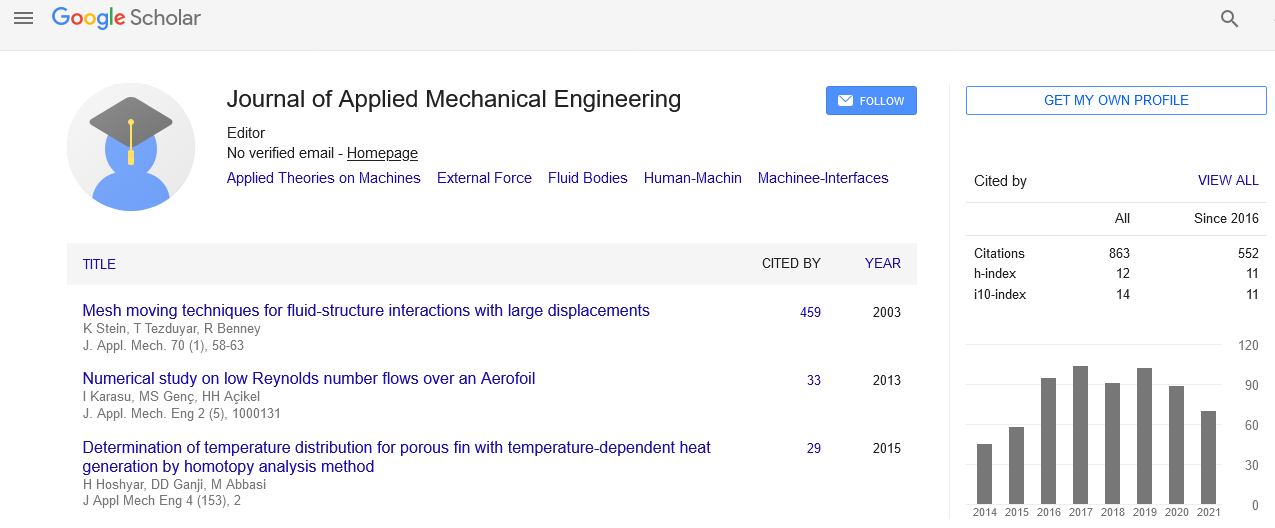Indexed In
- Genamics JournalSeek
- JournalTOCs
- CiteFactor
- RefSeek
- Hamdard University
- EBSCO A-Z
- OCLC- WorldCat
- Publons
- Google Scholar
Useful Links
Share This Page
Journal Flyer

Open Access Journals
- Agri and Aquaculture
- Biochemistry
- Bioinformatics & Systems Biology
- Business & Management
- Chemistry
- Clinical Sciences
- Engineering
- Food & Nutrition
- General Science
- Genetics & Molecular Biology
- Immunology & Microbiology
- Medical Sciences
- Neuroscience & Psychology
- Nursing & Health Care
- Pharmaceutical Sciences
The features of modeling of the nanofluid flows
2nd International Conference on Fluid Dynamics & Aerodynamics
October 19-20, 2017 | Rome, Italy
Valery Ya Rudyak
Novosibirsk State University of Architecture and Civil Engineering, Russia
Scientific Tracks Abstracts: J Appl Mech Eng
Abstract:
Nanofluid is two-phase systems consisting of a base fluid and nanoparticles. The study of the physics and transport properties of nanofluids has started relatively recently. It has been motivated by various applications of nanofluids in many different areas. Therefore, modeling the nanofluid flows is the fashion direction in fluid mechanics. However, the standard approaches are not applicable here. This is due to the fact that the nanofluids have no standard properties. In this paper, the features of the nanofluid flows modeling are analyzed and the thermophysical properties of nanofluids are discussed in detail. It was shown that viscosity and thermal conductivity of nanofluids as a rule did not describe by the classical theories. The transport coefficients of nanofluids depend not only on the volume concentration of the particles but also on their size and material. The viscosity increases with decreasing the particle size while the thermal conductivity increases with increasing the particle size, the reasons of such behavior is explained. Last part of the paper deals with the modeling of two important flows, the heat transfer of nanofluid in cylindrical channel and laminar turbulent transition in Poiseulle and tube flows are considered. It was shown that the heat transfer coefficient is determined by the flow mode (laminar or turbulent) of the nanofluid. The use of the nanofluids as a coolant significantly affect the magnitude of the heat transfer coefficient. The laminar-turbulent transition begins in all cases earlier (at smaller Reynolds numbers) than carrier fluid. In conclusion, the possibility of the use of traditional similarity criteria are discussed. It is shown that the variation in the Prandtl number during modeling does not allow obtaining adequate information about the flow under study, since each point of the obtained dependences corresponds to different nanofluids simply.
Biography :
Valery Ya Rudyak has graduated from Physical Faculty (Molecular Physics Department) of the Novosibirsk University. He completed his PhD dissertation in Kinetic Theory Of Gases. In 1990, he defended the Doctor of Science in Physics and Mathematics dissertation. He is Honored Science Worker of Russian Federation. He is Head of Theoretical Mechanics department of the Novosibirsk State University of Architecture and Civil Engineering, simultaneously he is Main Research Scientist of the Siberian Federal University. His main field of expertise includes the following subjects: nonequilibrium statistical mechanics, kinetic theory of gases, rarefied gas dynamics, physics and mechanics of transport processes, transport processes in nanofluids, flows in microchannels, multi-phases fluids, laminarturbulent transition, CFD and molecular dynamics simulation. He is author of 6 monographs and more than 200 scientific papers. The main subjects of his research are the nanofluids transport properties and modelling micro- and nanoflows.

